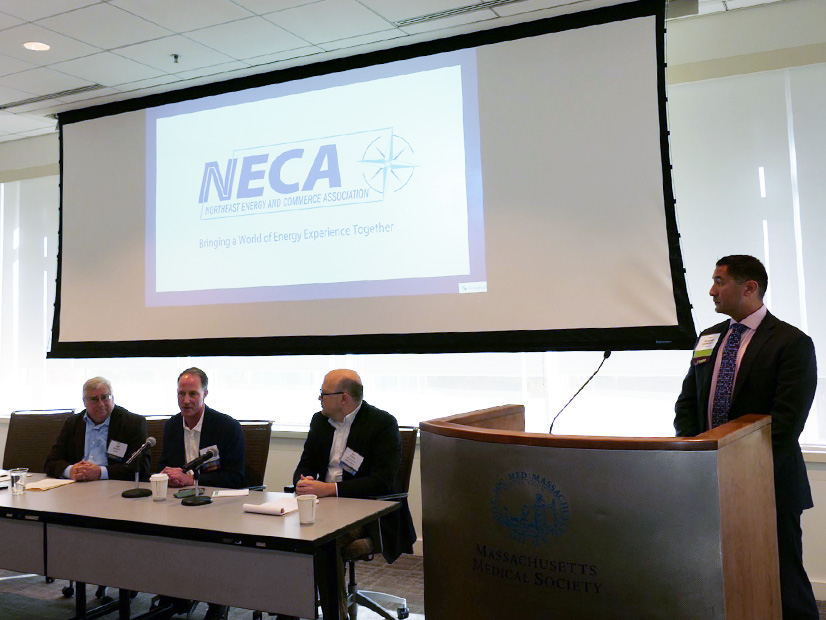
WALTHAM, Mass. — Representatives from ISO-NE, Massachusetts and industry groups met on Nov. 13 to discuss major changes to the RTO’s capacity market and the effects they could have on the region’s clean energy transition at the Northeast Energy and Commerce Association’s 2023 Power Markets Conference.
The potential changes include significant updates to ISO-NE’s resource capacity accreditation (RCA) methodology, along with prompt and seasonal capacity market formats. A prompt auction format would reduce the time between the Forward Capacity Auction (FCA) and the capacity commitment period (CCP) from more than three years to just a few months, while a seasonal market would break the yearlong CCP into distinct seasons with separate auctions.
ISO-NE recently filed for a one-year delay of FCA 19, which applies to the 2028/29 CCP. The RTO is planning to use the delay to finalize its RCA updates and consider the different formats. (See NEPOOL Votes to Delay FCA 19.)
Chris Geissler of ISO-NE said the RCA updates are a key component of preparing for increasing amounts of variable resources and higher winter peak loads.
“The concerns are no longer really about just the summer peak, but about a much broader set of cases,” Geissler said. “Because of that, we think it’s important to try to align how we credit resources for their contributions with what we actually expect them to deliver when we need it.”
Bruce Anderson of the New England Power Generators Association said the RCA changes are “an effort to create a capacity product that is substitutable across all resource types,” and that updating the accreditation methodology “makes a lot of sense” at a broad level. Anderson added that the current methodology may improperly value certain resource types.
The specific effects of the RCA changes on different resource types are not yet clear. Preliminary results released in April indicated that the updates would increase accreditation values for wind and passive demand response (such as energy efficiency), while significantly reducing the values for energy storage, solar and active DR. However, ISO-NE has stressed that the RCA project is ongoing, and the results are subject to change.
Anderson noted that peaking resources like many oil generators have a greater reliance on the capacity revenues than resources with a greater reliance on energy markets.
“For different resource types, these changes are more critical for their viability,” Anderson said. “Overall, the design creates a set of revenue opportunities where those resources can be viable.”
Jeff Bentz of the New England States Committee on Electricity said ISO-NE and its stakeholders need to strike a difficult balance between states’ requirements for renewable resources and the need to preserve reliability.
“I’m sure we’re going to find out with the new modeling that some of this may not be as favorable to the type of resources that the states want to see grow,” Bentz told the conference. He said that while the RCA changes might hurt the accreditation values of short-duration batteries, it could provide an incentive for longer-duration batteries with greater reliability benefits.
“If that incentive is out there, innovation grows and we get to longer-duration batteries for example, and they’re rated highly in the new program, that will be good,” Bentz said, noting there is a lot of work left to understand all the tradeoffs of the changes.
Prompt and Seasonal Implications
A seasonal market could be a way to differentiate between distinct reliability risks in the winter and summer periods, especially with the anticipated increase in winter risks, Geissler said, noting that ISO-NE has yet to make a recommendation on the potential move to prompt and seasonal formats.
Geissler added that a seasonal approach is a way to “be more granular in the capacity that we procure, so we’re making sure we’re meeting both the summer peak as well as extended winter cold spells.”
Regarding a prompt market, Bentz said the current Forward Capacity Market has faced issues stemming from new resources that clear the market but do not reach operations on time or at all.
“Moving to a prompt market — from a consumer standpoint — you’re going to get what you pay for on the day you pay for it,” Bentz said.
Anderson said these “ghost projects” bring down the market price in subsequent auctions. He added that delayed projects force ISO-NE to decide to either grant the resource an extension or file with FERC to terminate the contract.
“Any resource coming into the market on a prompt basis, assuming it’s going to be something in the order of say three, or even six months ahead of its delivery period, that’s a resource that’s built and ready to go,” Anderson said.
In contrast, Anderson said moving to a prompt market could hurt price formation by failing to give enough advance notice that a resource is retiring compared to the current three-year forward market. This dynamic would limit the time available to address any reliability or resource adequacy issues created by the retirement and could lead to an increase in reliability-must-run agreements to keep resources online.
“You see the same issue of price formation in the market, it’s dragging the price down for a resource that’s being retained outside of the market, not pricing itself in the market,” Anderson said.



